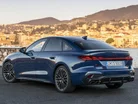Strategic Vision: Gas Owners are Ready to Embrace EVs

The rapid shift in US policy toward electrification, coupled with growing global EV markets like China, has left automakers grappling with how to prepare for the future.
Strategic Vision's New Vehicle Experience Study (NVES) highlights this challenge. It looks at gas-powered vehicle owners likely to transition to EVs and strategies to encourage adoption.
The study's findings are essential for automakers navigating the competitive and ever-evolving EV market.
Profiling the next EV adopters
Strategic Vision's proprietary EV Future Propensity Score (FPS) offers a unique lens into the minds of gas-powered vehicle buyers in 2023 and 2024 who don't currently own EVs.
The FPS considers interest in EVs as a future vehicle, past shopping behaviour and current attitudes to identify which drivers are primed for an EV switch.
The study found that sporty cars and compact vehicles lead the charge in EV adoption. Models like the MINI Cooper 4-Door Hardtop (FPS 116) top the list. The MINI's compact design, fun-to-drive nature and strong brand identity resonate with EV buyers, aligning with the appeal of modern EVs such as Tesla.
The Mazda Miata MX-5 (FPS 105) follows closely, catering to those who value exhilarating performance and sleek aesthetics. Luxury vehicles, including the BMW Z4 Roadster (FPS 101) and Audi A5/S5/RS5 Sportback (FPS 101), show strong potential to attract EV-curious buyers, blending premium performance with cutting-edge technology.
Challenges for trucks and domestic sedans
While sporty and compact cars thrive in the EV transition, trucks and certain domestic sedans face significant barriers. The Nissan Rogue Sport, Dodge Charger and GMC Acadia rank among the lowest on the FPS scale.
Buyers in these segments remain deeply connected to traditional powertrains, often valuing towing capacity, off-road capabilities and visceral engine sounds—areas where EVs have yet to meet consumer expectations.
Iconic models like the Dodge Challenger and Jeep Wrangler Unlimited further illustrate the divide. Buyers in these segments prioritise features that EV technology is still developing, such as long-range capability and rugged durability.
Budget-conscious options like the Ford Escape (FPS 21) and Chevrolet Trailblazer (FPS 19) highlight affordability's role in persuading consumers to consider EVs.
Understanding consumer values
The study highlights the importance of aligning EV features with consumer priorities. Sporty car buyers appreciate quick acceleration, quiet operation and advanced technology—qualities that EVs inherently deliver.
Conversely, truck and sedan buyers often remain loyal to traditional vehicles due to their emphasis on nostalgia, engine sounds and proven capabilities.
"It is essential that Dodge understands the values and motivations that will get consumers to consider a Dodge EV and—spoiler alert—it isn't environmentally friendly."
Understanding values highlights the need for automakers to understand their audience deeply and tailor messaging accordingly.
Opportunities for automakers
The study's insights provide automakers with a roadmap for future product strategies. Models like the MINI Cooper and Mazda Miata demonstrate how EVs can appeal to buyers seeking agility and excitement. Premium brands such as BMW and Audi illustrate the potential for luxury EVs that deliver exceptional performance.
Trucks and domestic sedans, however, will require innovative solutions to overcome consumer hesitations. Advancements in towing capacity, durability and affordability could bridge the gap.
Subaru offers an inspiring example, with the Subaru Ascent's FPS indicating that nearly one in four owners are actively exploring EVs for their next purchase. Adventure-oriented brands can maintain their rugged appeal while tapping into eco-conscious buyers.
Building the EV future
Alexander Edwards, President of Strategic Vision, summarises the challenge for automakers: "The data reveals a clear pattern: EV adoption isn't just about technology; it's about aligning with the values and priorities of specific consumer segments. Automakers must tailor their messaging and product offerings to resonate with these groups to accelerate EV adoption."
Ultimately, success in the EV market lies in offering vehicles that don't compromise range, price, or refuelling options but redefine the driving experience with unparalleled innovation, performance and personalisation.
The rewards for automakers ready to embrace the challenge are vast as the EV revolution gains global momentum.
Stay informed and inspired with the EV Magazine community by signing up for our free weekly newsletter. Each week, receive in your inbox the latest industry news and in-depth insights into the world of electric vehicles, sustainability and cutting-edge innovations
Subscribe now, don’t miss the opportunity to stay ahead in the fast-evolving EV industry
EV Magazine is a BizClik brand
- PIT BOOST: Formula E's Game-Changing Race InnovationTechnology
- EV Battery Production: Schneider Electric & Liminal Team UpCharging & Infrastructure
- GM Aids Recovery Efforts for California Wildfire VictimsCharging & Infrastructure
- UKPN Trials Zero-Emission Electric Diggers with FalcoSustainability


